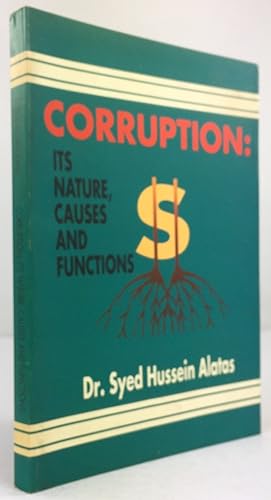Alatas Syed Hussein (49 results)
FeedbackSearch filters
Product Type
- All Product Types
- Books (49)
- Magazines & Periodicals (No further results match this refinement)
- Comics (No further results match this refinement)
- Sheet Music (No further results match this refinement)
- Art, Prints & Posters (No further results match this refinement)
- Photographs (No further results match this refinement)
- Maps (No further results match this refinement)
- Manuscripts & Paper Collectibles (No further results match this refinement)
Condition Learn more
- New (35)
- As New, Fine or Near Fine (5)
- Very Good or Good (4)
- Fair or Poor (No further results match this refinement)
- As Described (5)
Binding
Collectible Attributes
- First Edition (4)
- Signed (No further results match this refinement)
- Dust Jacket (3)
- Seller-Supplied Images (18)
- Not Print on Demand (41)
Language (2)
Free Shipping
Seller Location
Seller Rating
-
Thomas Stamford Raffles: Schemer or Reformer?
Published by National University of Singapore Press, 2020
ISBN 10: 9813251182 ISBN 13: 9789813251182
Language: English
Seller: ThriftBooks-Dallas, Dallas, TX, U.S.A.
£ 5.20
Convert currency£ 2.02 shipping from U.S.A. to United KingdomQuantity: 1 available
Add to basketPaperback. Condition: Very Good. No Jacket. May have limited writing in cover pages. Pages are unmarked. ~ ThriftBooks: Read More, Spend Less 0.3.
More buying choices from other sellers on AbeBooks
New offers from £ 11.08
Used offers from £ 7.22
Also find Softcover
-
Corruption And The Destiny Of Asia
ISBN 10: 9839236229 ISBN 13: 9789839236224
Language: English
Seller: Hamelyn, Madrid, M, Spain
£ 4.51
Convert currency£ 5.20 shipping from Spain to United KingdomQuantity: 1 available
Add to basketCondition: Como nuevo. : Este libro explora la corrupción en Asia y su impacto en el destino del continente. Analiza las causas y consecuencias de la corrupción, así como las posibles soluciones para combatirla. El autor, Hussein Alatas, ofrece una perspectiva profunda sobre este problema crucial y su influencia en el desarrollo de Asia. EAN: 9789839236224 Tipo: Libros Categoría: Negocios y Economía Título: Corruption And The Destiny Of Asia Autor: Hussein Alatas (Syed) Idioma: en Páginas: 164 Formato: tapa blanda.
-
Soft Cover. Condition: Good. No Jacket. Paperback. 195pp. A little edgewear to covers. Ex-library stamp to front cover and inside front cover. A decent copy. (bs21).
-
The Problem of Corruption
Published by The Other Press Sdn Bhd, 2018
ISBN 10: 9839541978 ISBN 13: 9789839541977
Language: English
Seller: Revaluation Books, Exeter, United Kingdom
Paperback. Condition: Brand New. 182 pages. 8.50x5.50x0.46 inches. In Stock.
-
Corruption and the Destiny of Asia
Published by Prentice Hall, Malaysia, 1999
ISBN 10: 9839236083 ISBN 13: 9789839236088
Language: English
Seller: Goulds Book Arcade, Sydney, Newtown, Sydney, NSW, Australia
£ 24.97
Convert currency£ 16.30 shipping from Australia to United KingdomQuantity: 1 available
Add to basketPaperback. Condition: Very Good. 164 pages. Books listed here are not stored at the shop. Please contact us if you want to pick up a book from Newtown.
-
Syed Hussein Alatas and Critical Social Theory: Decolonizing the Captive Mind (Studies in Critical Social Sciences)
Seller: Magers and Quinn Booksellers, Minneapolis, MN, U.S.A.
£ 30.24
Convert currency£ 15.56 shipping from U.S.A. to United KingdomQuantity: 1 available
Add to basketpaperback. Condition: New. Brand New.
-
£ 55.74
Convert currencyFree shipping within United KingdomQuantity: Over 20 available
Add to basketCondition: New. In.
-
Corruption: It's Nature, Causes and Functions.
Published by Kuala Lumpur, S. Abdul Majeed & Co. 1991., 1991
£ 31.29
Convert currency£ 10.42 shipping from Germany to United KingdomQuantity: 1 available
Add to basket220 S. Orig. - Brosch. Gut erhalten.
-
Intellectuals in Developing Societies
Published by Taylor & Francis Ltd, 1977
ISBN 10: 0714630047 ISBN 13: 9780714630045
Language: English
Seller: Buchpark, Trebbin, Germany
£ 90.20
Convert currency£ 8.59 shipping from Germany to United KingdomQuantity: 1 available
Add to basketCondition: Sehr gut. Zustand: Sehr gut | Sprache: Englisch | Produktart: Bücher.
More buying choices from other sellers on AbeBooks
New offers from £ 130.11
Used offers from £ 98.79
Also find Hardcover
-
Thomas Stamford Raffles 1781-1826 Schemer or Reformer? An Account of His Political Philosophy and Its Telation to the Massacre of Palembang, the Banjarmasin Affair, and Some of His Views and Legislations, during His Colonial Career in Java, Sumatra, and Singapore
Published by Angus and Robertson, Sydney, 1971
ISBN 10: 0207123772 ISBN 13: 9780207123771
First Edition
£ 57.25
Convert currency£ 37.06 shipping from U.S.A. to United KingdomQuantity: 1 available
Add to basketCondition: Near Fine. Dust Jacket Condition: Very Good. 1st ed. 65p. Original red orange boards. dj. 20 cm. Jacket backstrip faded. Also published as a paperback.
-
The Myth of the Lazy Native. A Study of the Image of the Malays, Filipinos and Javanese from the 16th to the 20th Century and its Function in the Ideology of Colonial Capitalism.
Published by Frank Cass., London., 1977
Seller: Asia Bookroom ANZAAB/ILAB, Canberra, ACT, Australia
First Edition
£ 250.19
Convert currency£ 16.68 shipping from Australia to United KingdomQuantity: 1 available
Add to basketFirst Edition. 267pp, bibliography, index, a very good copy in dustjacket. A profound and wide-ranging exploration of the notion of the "lazy native", who was considered indolent by nature or because of his environment, a notion which was a mainstay of the European colonial mentality.
-
[Ceylon]. Old Ceylon in Pictures.
Seller: Fahrenheit 451 Antiquarian Booksellers, Leiden, Netherlands
First Edition
£ 67.06
Convert currency£ 16.75 shipping from Netherlands to United KingdomQuantity: 1 available
Add to basketNo place (Sri Lanka), Sarvodaya Vishva Lekha, 1997, 1st ed., (8) text-pages, 77 b/w photogrpahic plates, original hardcover with dustjacket, oblong quarto.
-
The Sociology of Corruption. The Nature, Function, Causes and Prevention of Corruption. [Rare first edition].
Seller: Fahrenheit 451 Antiquarian Booksellers, Leiden, Netherlands
First Edition
£ 223.53
Convert currency£ 16.75 shipping from Netherlands to United KingdomQuantity: 1 available
Add to basketSingapore, Donald Moore Press Ltd., 1068, 1st ed., (8),87 pag., original boards. = Rare first edition - a revised edition was published in 2015 under the title The Problem of Corruption. The Problem of Corruption is a well written and short treatise on the sociology of corruption by Syed Hussein Alatas, that rises far above some of the other treatises on corruption because of the thorough treatment and the theoretical insights that Alatas brings to his interpretation. It is a stimulating treatise because through his contextual approach to the subject Alatas deflates a number of hypotheses that have been put forward by a number of other investigators of the problem of corruption in underdeveloped countries.Most of the book is devoted to a detailed examination of the nature, function, causes, and prevention of corruption. In presenting his arguments and views the author draws considerably from the existing literature on corruption and frequently points out the short-comings of various other interpretations of the problem. As he himself points out, "the aim of this monograph is not a descriptive study of corruption in any particular area, but a theoretical exploration of the phenomenon, supported by available contemporary data on corruption." In his discussion of the nature of corruption, the author avoids giving any short-cut definition of corruption. He gives comprehensive criteria by which the complex phenomenon of corruption can be classified. In his discussion of the function and causes of corruption the author provides a critical examination of the various existing propositions about the function and causes of corruption. Using the contextual approach, he refutes some of the prevailing hypotheses concerning the functional role of corruption in the developmental process. Alatas points out that those who suggest that corruption has some positive function do not link their analysis with the different stages of corruption. He identifies three stages of corruption. Firstly, the stage at which corruption is relatively restricted and does not affect a wide area of social life. The second stage is where corruption has become rampant and all-pervading. The third stage is when corruption becomes self-destructive, having destroyed the fabric of society. It is possible that corruption may have some functional value at the first stage but widespread corruption inevitably impedes the prospects for sustained development. In his analysis of the causes of corruption, Alatas challenges the alleged impact of the "gift" as a traditional cultural practice whose predisposing effect has been to further a contemporary sub-culture of corruption. He states: "That there is no significant causal correlation between the gift and corruption is proved by the fact that the expansion and contraction of corruption have nothing to do with a similar occurrence in the field of gift behavior. Furthermore, the indirect causal influence of a gift is multi-dimensional. It can turn people away from corruption, apart from attracting them to it." In his view, the significance is given to the "gift" institution and the role of traditional family ties should be reexamined in the light of contextual and historical analysis. There is no single cause of corruption. He subscribes to the theory of multiple factors in the causation of corruption, each of which is of varying importance, depending on spatial and temporal factors. In the prevention of corruption, Alatas identifies some factors which mitigate corruption. These factors include the following: (1) A positive attachment to the government and spiritual involvement in the task of progress from both the public and bureaucracy. (2) Efficient administration and the proper structural adjustment of government machinery and regulation so as to avoid the creation of sources of corruption. (3) Favorable historical and sociological conditions. (4) The function of an anti-corruption value system. (5) The inspiring leadership of a group with high moral and intellectual standards. (6) An educated public opinion. And finally, he suggests that in addition to these methods to curb the growth of corruption, the dissemination of the teachings of sacral personalities against corruption can be useful in curbing corruption. One can dispute some of the assertions and conclusions of this book but its main contribution is that it sets a format for sophisticated intellectual encounters with the complex problem, of corruption. The Problem of Corruption warrants the attention not only of the academic community but also of any person who is interested in the dynamics of modern bureaucracy, social change, and economic development.













